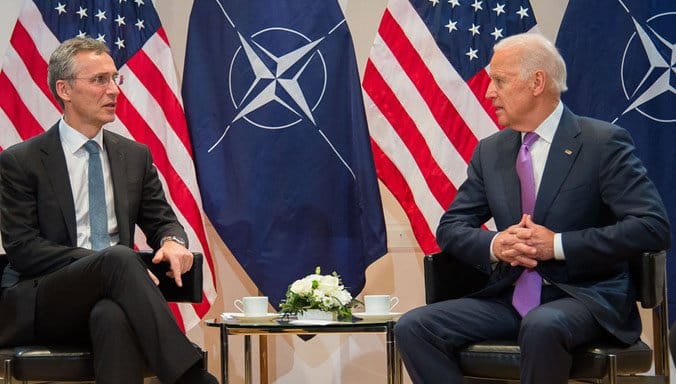
Several crucial decisions likely will be made at this week’s NATO summit meeting. The most important of all involves Ukraine’s application to join the Alliance. Zealotry for Ukraine in some NATO capitals is so strong that that a path to membership for that country is being considered even in the midst of an ongoing war and unresolved territorial disputes. The most likely move would be to approve a Membership Action Plan (MAP) for Kyiv, which normally is the final substantive measure that an applicant country must fulfill before being admitted to the Alliance. The usual pro-NATO, pro-Ukraine lobbyists in the West are pushing very hard for that step.
It is a sad comment on the judgment and prudence of NATO leaders that they are even considering such a move. The Kremlin has made it clear on multiple occasions since President George W. Bush first proposed NATO membership for Ukraine in 2008 that such a step would cross a bright red line as far as Russia’s vital security interests are concerned. Yet policymakers in the Bush, Obama, Trump, and Biden administrations remained stunningly tone-deaf to Moscow’s repeated, ever-more-emphatic, warnings.
Bush’s initial diplomatic foray, which was supported by most East European members of the Alliance, was blunted by opposition from some of NATO’s older members, especially France and Germany. German Chancellor Angela Merkel was especially reluctant to add Kyiv, citing both Ukraine’s endemic corruption and the danger of antagonizing Russia. Unfortunately, French-German resistance could only produce a compromise that delayed Ukraine’s ambitions to join NATO. No explicit membership invitation was extended in the final declaration from the 2008 Bucharest summit, but a commitment was made that Ukraine could join at some point in the future.
Moscow viewed even that move as a suspicious provocation. Subsequent US and NATO actions deepened the level of suspicion and hostility. Western meddling in Ukraine to help nationalists overthrow the country’s elected, pro-Russia president, Viktor Yanukovich, in 2014 produced the first significant hostile response by the Kremlin, seizing Ukraine’s Crimea Peninsula, the home of Russia’s Black Sea fleet. Matters grew steadily worse after those events.
Indeed, the United States, the United Kingdom, and some other NATO countries worked to make Ukraine a member of the Alliance in all but name. Arms shipments flowed to Kyiv, Washington trained Ukrainian troops and built ties with Kyiv’s intelligence apparatus, and joint military exercises between NATO and Ukrainian forces took place. Russia’s 2021 demands for the withdrawal of Alliance troops and military hardware from its borders and insistence on Ukraine’s neutral status made it clear that President Vladimir Putin and his colleagues were not concerned merely about a NATO membership card for Kyiv. The West’s increasingly unsubtle attempt to make Ukraine an informal NATO military asset was considered equally unacceptable.
The failure of Washington and its alliance partners to heed the escalating warnings coming from Moscow was the principal contributor to the ongoing tragedy of the Russia-Ukraine war. Instead of backing away, however, the Biden administration and other NATO hardliners seem determined to make matters even worse. Not only have several countries provided Kyiv with ever more potent weaponry (as though it is an Alliance member warranting aid under Article 5), but the issue of formal membership is back on the table.
Offering to let Ukraine join NATO (now or in the future) would be the final insult and provocation to Russia. France and Germany should have stuck to their positions in 2008 and made it clear that the Alliance would never include Ukraine. A great deal of needless tragedy might have been avoided if they had done so. Instead of firmly closing the door, they accepted the eventual goal of NATO membership for Kyiv.
The key question now is whether France, Turkey, Hungary, and other more prudent NATO countries will stand firm and prevent an even greater folly. Germany, under the leadership of Chancellor Olaf Scholz and his odious, pro-war foreign minister Annalena Barbock, cannot be counted upon to act sensibly. However, because Alliance decisions supposedly must be paid by consensus, opposition to Washington’s latest reckless initiative by those three countries should be more than sufficient. All of those governments, though, are under tremendous pressure from the United States and other members to go along with the latest reckless course.
Instead of caving to such bullying, they need to push Washington, London, Warsaw, and other centers of pro-Ukraine dogmatism in the opposite direction. The only hope for a peaceful Eastern Europe going forward is a fully neutral Ukraine. That country must have the same status as Austria. Anything else will remain an intolerable provocation to Moscow, generating fears that NATO will continue to use Kyiv in proxy wars against Russia. The current summit gives more prudent members of the Alliance an opportunity (perhaps the final opportunity) to save Europe from the consequences of the policies that Ukraine’s pro-war patrons are pushing.
Reprinted with permission from Antiwar.com.

